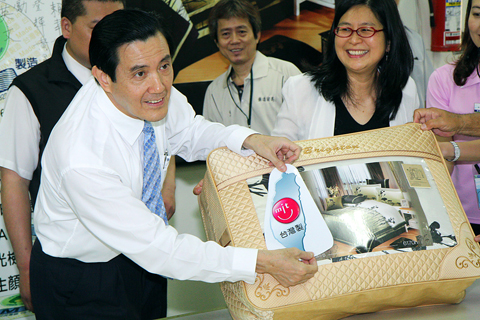President Ma Ying-jeou (馬英九) yesterday said his remark that Taiwan would “never” ask the US to fight for Taiwan in a war was made because he was confident there would be no war in the Taiwan Strait during his presidency.
Chinese Nationalist Party (KMT) spokesman Su Jun-pin (蘇俊賓) quoted Ma, who doubles as KMT chairman, as saying after the party’s closed-door Central Standing Committee meeting yesterday that he sought to turn Taiwan from a “troublemaker” to a peacemaker.
“The President has the utmost confidence in peace across the Taiwan Strait and believes that there will not be war while he is in office,” Su said. “If there is no war in the Taiwan Strait, we definitely will not ask the US to fight for Taiwan.”

PHOTO: CNA
Ma caused a stir when he said Taiwan would “never ask the Americans to fight for Taiwan” during an interview with CNN’s Christiane Amanpour last week. Ma said in the interview that the risk for the US was at its lowest in 60 years, which he credited to his administration’s efforts to improve cross-strait relations.
Su yesterday said the Ma administration would continue to procure arms from the US to protect the country’s security and to manifest its resolve to defend itself.
“We will not let our guard down and will remain prepared against war despite cross-strait detente,” Su quoted Ma as saying.
Su said Ma also said that the reason he spoke English during the interview was because translation would have taken up too much of the interview time.
Meanwhile, the Washington-based Formosan Association for Public Affairs (FAPA) criticized Ma for what it said was inviting “aggression” from China.
The group said it was “deeply concerned” about the “never” remarks made by Ma during the CNN interview.
FAPA president Bob Yang (楊英育) said Ma’s remarks were totally at odds with the basic US policy of strategic ambiguity.
Under the policy, China is meant to be left guessing at how the US would respond to an attack on Taiwan. That uncertainty was designed to act as a strong deterrent against provocative action.
“Ma’s remarks leave China with the impression that this ambiguity is removed, thereby undermining the deterrence provided by the US presence in the region,” Yang said.
In a prepared statement, Yang said: “We are clearly in favor of a peaceful resolution, but that can only be achieved if Taiwan shows the resolve to defend itself. The statement made by Ma actually invites aggression from China, which has been threatening Taiwan’s free and democratic existence for many years.
“It amounts to pre-emptive surrender by the Chinese Nationalist Kuomintang [KMT] government in Taiwan,” he said.
Yang said Ma’s remarks “fly in the face” of US commitments under the Taiwan Relations Act, which commits the US to maintain the capacity to resist any resort to force or other forms of coercion that would jeopardize the security or the social or economic system of Taiwan.
FAPA, a US-wide organization with substantial support in the Taiwanese community, believes that it is essential for Ma to issue a clarification and to state that his administration “adheres to the basic policies on which the strong relations with the US are based.”
Yang also called on Ma to “refrain from making any moves which undermine Taiwan’s freedom, democracy and independence.”

Taiwan is stepping up plans to create self-sufficient supply chains for combat drones and increase foreign orders from the US to counter China’s numerical superiority, a defense official said on Saturday. Commenting on condition of anonymity, the official said the nation’s armed forces are in agreement with US Admiral Samuel Paparo’s assessment that Taiwan’s military must be prepared to turn the nation’s waters into a “hellscape” for the Chinese People’s Liberation Army (PLA). Paparo, the commander of the US Indo-Pacific Command, reiterated the concept during a Congressional hearing in Washington on Wednesday. He first coined the term in a security conference last

Prosecutors today declined to say who was questioned regarding alleged forgery on petitions to recall Democratic Progressive Party (DPP) legislators, after Chinese-language media earlier reported that members of the Chinese Nationalist Party (KMT) Youth League were brought in for questioning. The Ministry of Justice Investigation Bureau confirmed that two people had been questioned, but did not disclose any further information about the ongoing investigation. KMT Youth League members Lee Hsiao-liang (李孝亮) and Liu Szu-yin (劉思吟) — who are leading the effort to recall DPP caucus chief executive Rosalia Wu (吳思瑤) and Legislator Wu Pei-yi (吳沛憶) — both posted on Facebook saying: “I

Sung Chien-liang (宋建樑), who led efforts to recall Democratic Progressive Party (DPP) Legislator Lee Kun-cheng (李坤城), was released on bail of NT$80,000 today amid outcry over his decision to wear a Nazi armband to questioning the night before. Sung arrived at the New Taipei District Prosecutors’ Office for questioning in a recall petition forgery case last night wearing a red armband bearing a swastika, carrying a copy of Adolf Hitler’s Mein Kampf and giving a Nazi salute. Sung left the building at 1:15am without the armband and covering the book with his coat. Lee said today that this is a serious

A mountain blaze that broke out yesterday morning in Yangmingshan National Park was put out after five hours, following multi agency efforts involving dozens of fire trucks and helicopter water drops. The fire might have been sparked by an air quality sensor operated by the National Center for High-Performance Computing, one of the national-level laboratories under the National Applied Research Laboratories, Yangmingshan National Park Headquarters said. The Taipei City Fire Department said the fire, which broke out at about 11am yesterday near the mountainous Xiaoyoukeng (小油坑) Recreation Area was extinguished at 4:32pm. It had initially dispatched 72 personnel in four command vehicles, 16